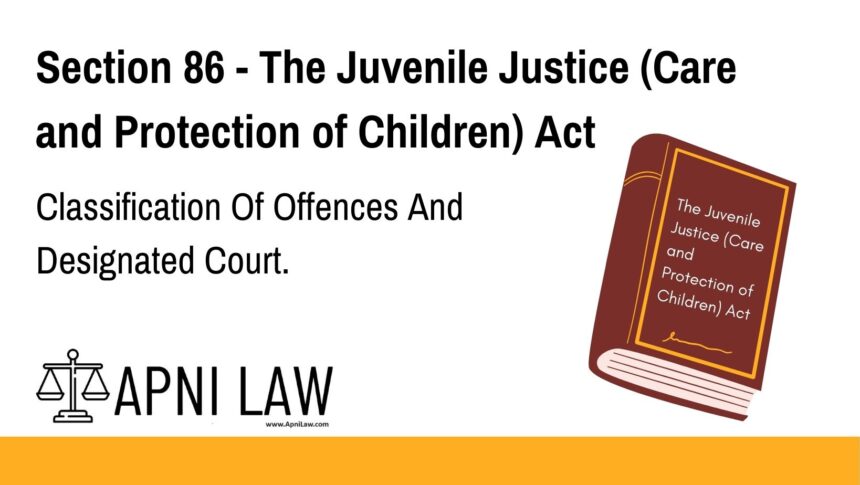Code: Section 86 of the Juvenile Justice (Care and Protection of Children) Act
86. Classification of offences and designated court
(1) Where an offence under this Act is punishable with imprisonment for a term of more than seven years, then, such offence shall be cognizable and non-bailable.
(2) Where an offence under this Act is punishable with imprisonment for a term of three years and above, but not more than seven years, then, such offence shall be non-cognizable and non-bailable.
(3) Where an offence under this Act is punishable with imprisonment for less than three years or with fine only, then, such offence shall be non-cognizable and bailable.
(4) Notwithstanding anything contained in the Code of Criminal Procedure, 1973 (2 of 1974) or the Commission for Protection of Child Rights Act, 2005 (4 of 2006) or the Protection of Children from Sexual Offences Act, 2012 (32 of 2012), offences under this Act shall be triable by the Children’s Court.
Explanation of Section 86 of the Juvenile Justice Act
Section 86 of the Juvenile Justice (Care and Protection of Children) Act lays out the classification of offences under this Act based on the severity of punishment. It specifies whether an offence is cognizable or non-cognizable, bailable or non-bailable, and also outlines the Children’s Court as the designated court for such offences.
- Cognizable and Non-Bailable: If the offence carries a punishment of more than seven years of imprisonment.
- Non-Cognizable and Non-Bailable: If the offence carries imprisonment for a term between three to seven years.
- Non-Cognizable and Bailable: If the offence carries imprisonment of less than three years or is punishable with a fine only.
- Designated Court: The offences under this Act will be triable exclusively by the Children’s Court, overriding other laws like the Code of Criminal Procedure, 1973, Commission for Protection of Child Rights Act, 2005, or the Protection of Children from Sexual Offences Act, 2012.
Illustration
Example 1: Cognizable and Non-Bailable Offence
A person is found guilty of an offence under the Juvenile Justice Act punishable by more than seven years in prison. As per Section 86(1), the offence will be treated as cognizable and non-bailable, and the person can be arrested without a warrant.
Example 2: Non-Cognizable and Bailable Offence
A minor is charged with an offence under the Juvenile Justice Act punishable by imprisonment of less than three years. The case will be non-cognizable and bailable, meaning the accused will not be arrested without a warrant and can seek bail.
Common Questions and Answers on Section 86
1. What does cognizable and non-bailable mean in Section 86?
- Answer: A cognizable offence allows the police to arrest the accused without a warrant, while a non-bailable offence means that the accused cannot get bail unless the court grants it.
2. Which court hears cases under Section 86 of the Juvenile Justice Act?
- Answer: All offences under this Act, regardless of severity, are triable exclusively in the Children’s Court.
3. Can the classification of offences in Section 86 override other laws?
- Answer: Yes, Section 86(4) ensures that the classification of offences under the Juvenile Justice Act takes precedence over other related laws like the Criminal Procedure Code or the Protection of Children from Sexual Offences Act, 2012.
Conclusion
Section 86 of the Juvenile Justice (Care and Protection of Children) Act helps in classifying offences based on their severity, determining whether they are cognizable or non-cognizable, and bailable or non-bailable. The section also ensures that the cases are exclusively triable by the Children’s Court, thus streamlining the judicial process for juveniles.








